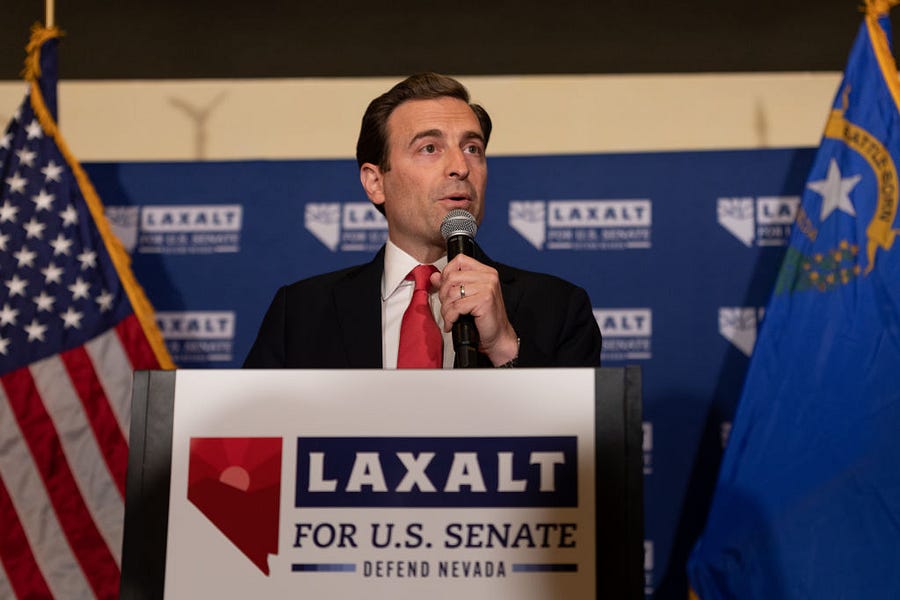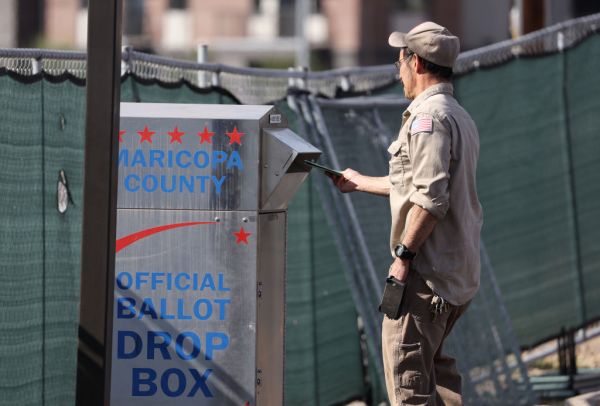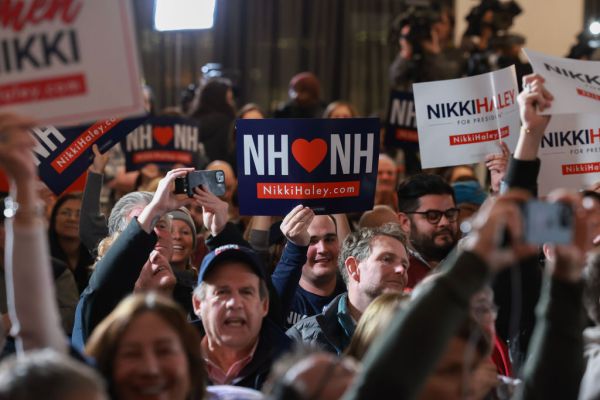Less than five weeks until the midterm elections, election analysts at FiveThirtyEight and Sabato’s Crystal Ball consider only Nevada and Georgia true toss-ups among this year’s list of competitive Senate races.
But Republican candidate Herschel Walker’s troubles in Georgia—he now stands accused of paying for a former girlfriend’s abortion, per a Daily Beast report published Monday—may bolster the conventional wisdom election analysts have held for months: the Senate majority could hinge on Nevada. If Republicans fail to capture the seat, for instance, they would likely need to win in Arizona, Pennsylvania, or even Georgia to tip the 50-50 Senate in their favor.
The race between Republican former Attorney General Adam Laxalt and incumbent Democratic Sen. Catherine Cortez Masto is a dead heat, with several recent polls showing Laxalt with a narrow lead. But the contest hasn’t produced the dramatic news cycles that have characterized battleground Senate races in battleground states like Georgia, Arizona, Pennsylvania, and Ohio, and Google searches for “Nevada Senate” have trailed those other states for months.
“The two candidates out in Nevada don’t have that same sort of inherent fascination to them,” said Boston College political scientist David Hopkins. “It’s an incredibly important race that could well be a decisive race in actual control of the Senate, and it is definitely under-covered.”
Instead of scandal and culture wars, the race could come down to kitchen table issues like inflation. Even though gas prices are falling nationwide, in Nevada they’re still at roughly $5.50 per gallon on average, according to AAA. Bruce Parks, chairman of the Washoe County Republican Party, sees the “failed economy” as a way to win voters.
Democrats hope to counter those efforts. Chris Roberts, chairman of the Democratic Party in Clark County—which encompasses Las Vegas and contains nearly three quarters of the state’s population—pointed to the Inflation Reduction Act as an example of Democrats “delivering in ways Republicans can’t.” Every Senate Democrat voted in favor of the legislation, including Cortez Masto.
But her unfavorability rating sits at 52 percent among likely Nevada voters, according to a late September poll conducted by the Nevada Independent and OH Predictive Insights. The same poll shows President Joe Biden’s unfavorability rating in the state even higher, at 57 percent.
One demographic is critical to both parties’ efforts to connect pocketbook issues: Latino voters, who constituted nearly 20 percent of Nevada’s eligible voting population in 2020, according to Pew Research.
“The biggest thing that we hear from Latino voters is the kitchen table stuff—money to get by, money to pay the bills,” Roberts said.
When Cortez Masto replaced then-retiring Democratic Sen. Harry Reid in 2016, she claimed the distinction of being the first Hispanic woman elected to the U.S. Senate. But political coalitions aren’t stagnant. According to data collected by the progressive data firm Catalist, Latino support for Democratic presidential candidates dropped 9 points in Nevada from 2016 to 2020.
Party registration data in Nevada also reflects a shift away from Democrats. According to data from the Nevada Secretary of State’s office, the share of registered Democratic voters has fallen from 39 percent in October 2016 to 33 percent percent in August 2022. And although Republicans still lagged slightly behind at 29 percent of the registered voting population in August, the proportion of non-affiliated registered voters now sits at roughly 30 percent—up from 21 percent six years ago when Cortez Masto was first elected.
Those trends could pay dividends for Laxalt, a former Nevada attorney general who ran an unsuccessful campaign for governor in 2018.
On the campaign trail, Laxalt has touted his close ties to former President Donald Trump. He co-chaired Trump’s re-election operation in Nevada and was involved in efforts to challenge the results after Trump lost. And on Steve Bannon’s podcast in January, he called election integrity the “hottest topic” of his 2022 Senate campaign.
In Roberts’ view, the race is yet another referendum on Trump.
“And that sucks,” the Democratic official said. “That’s horrible.” He thinks Democrats should keep the focus on their party’s domestic policy agenda.
“It’s not that Nevada needs to stand up and make sure the rest of the country has a Democratic Senate,” he said. “It’s that Nevadans need to stand up and send Catherine Cortez Masto back to the Senate, because she’s the option that will best represent them and their needs.”
Raw fundraising numbers indicate the message is getting through to donors. By June 30, Cortez Masto had outraised Laxalt $30 million to $7 million, per second quarter Federal Election Commission filings. Her campaign announced a $15 million haul from July through September.
But comparatively speaking, Democratic donors are more interested in defending other Senate incumbents like Raphael Warnock in Georgia, who has raised more than $110 million this midterm cycle.
The Georgia Senate race had election analysts on the edges of their seats long before the Daily Beast broke the alleged Herschel Walker-subsidized-abortion story Monday evening, which also inspired scathing criticism from one of his children.
There’s also Ohio, where 10-term Democratic Rep. Tim Ryan is launching an economic populist campaign against bestselling author and Republican candidate J.D. Vance. Meanwhile, an ever-evolving news cycle continues to unfold in Pennsylvania, where voters will choose between Democratic Lt. Gov John Fetterman—a progressive former mayor who suffered a stroke on the campaign trail—and Republican Mehmet Oz, the Trump-endorsed celebrity doctor from New Jersey.
In a midterm cycle dominated by heterodox, headline-grabbing Senate candidates in other states, it’s hard for Nevada to compete.“It’s not as flashy as John Fetterman, Dr. Oz,” Roberts said. “There aren’t as many fun sound bites that the news can run. And I think that might be to our detriment.”










Please note that we at The Dispatch hold ourselves, our work, and our commenters to a higher standard than other places on the internet. We welcome comments that foster genuine debate or discussion—including comments critical of us or our work—but responses that include ad hominem attacks on fellow Dispatch members or are intended to stoke fear and anger may be moderated.